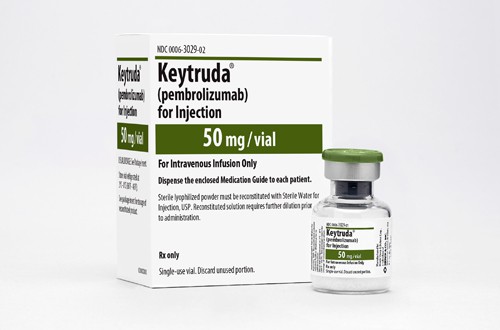
EU regulators don’t seem to be as comfortable with Merck & Co’s data on Keytruda as a first-line treatment for non-squamous non-small cell lung cancer (NSCLC) as their counterparts in the US.
Merck – known as MSD outside the US and Canada – confirmed that it had to withdraw its marketing application for the checkpoint inhibitor in NSCLC with the EMA, having picked up approval from the FDA in May, after it became clear that the regulator was not prepared to approve on the strength of the KeyNote-0241 trial.
The decision shows that EU regulators are not happy to approve new cancer drugs based on phase II data, although this is becoming increasingly common in the US, according to analyst Umer Raffat of ISI Evercore.
Cohort G of the KeyNote-021 study revealed increased response rate and progression-free survival (PFS) for those on its given PD-1 inhibitor Keytruda (pembrolizumab) versus placebo given on top of Eli Lilly’s Alimta (pemetrexed) and carboplatin.
Keytruda was approved for first-line NSCLC in patients whose tumours express higher levels of PD-L1 on the strength of the KeyNote-024 study, a cautious approach that paid dividends when rival PD-1 inhibitor Opdivo (nivolumab) from Bristol-Myers Squibb (BMS) failed to show significant improvements in an all-comer study that recruited patients regardless of PD-L1 status.
The FDA approval of the updated indication based on KeyNote-021 consolidated Merck’s lead in the first-line setting, with analysts suggesting this would filter through to second-line NSCLC treatment where the two drugs compete head-to-head. Merck will now have to wait longer before it can capitalise on that situation in Europe.
In a terse statement, Merck said it was “confident in the clinical data from this rigorously conducted trial” and has a number of other trials ongoing in first-line NSCLC that it will share with regulators when data becomes available.
That includes a revamped KeyNote-189 trial, which will look at overall survival with the combination of Keytruda, Alimta and carboplatin as front-line therapy in non-squamous NSCLC and is due to generate results in early 2019.
There was good news for Keytruda in Merck’s third-quarter statement, however, with the drug passing the $1bn threshold in the quarter to become the second-largest drug in its portfolio after its Januvia/Janumet diabetes franchise. Overall group sales dipped 2% in the quarter to $10.3bn.




